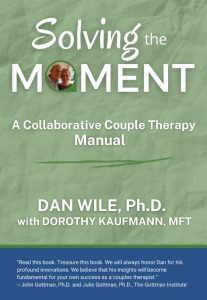In their first couple therapy session, Bonnie and Greg present their problems in broad outlines. I want to get to examples. It is only by hearing what partners actually say to each other in specific situations that it’s possible to help them come up with the needed conversation. Before shifting to examples, however, I want […]
Guardian of the Conversation
At the root of Collaborative Couple Therapy is the idea that partners in a problematic exchange are in need of a conversation—a conversation of reconciliation in the case of partners who have been fighting and reconnection in the case of partners who are withdrawn. My job, in addition to helping initiate the needed conversation, is […]
End-of-the-Session Question
At the end of each session, I ask, “What’s been disappointing about the session and what about it, if anything, has been useful?” If the session has been clearly useful, I omit the “if anything.” If the session has been clearly difficult, I emphasize the “if anything.” If “disappointing” seems too mild a word given […]
The Sentence-Completion Question in C...
I am writing a book—Solving the Moment: A Collaborative Couple Therapy Manual—which is based on my blog entries. Among the special methods I discuss in this book is the sentence-completion question. One way to join with partners in Collaborative Couple Therapy is to double for them. Another is to add a few words to what […]
A Distillation of Collaborative Coupl...
I am writing a book—Solving the Moment: A Collaborative Couple Therapy Manual— based on my blog entries. Here is the introductory chapter, which grew out of my May 27, 2019 blog: A Synopsis of Collaborative Couple Therapy. In this introduction, I lay out the essential features of Collaborative Couple Therapy, presenting in a few pages […]
Scanning for Acknowledgements
As described in previous blog entries, doubling, originally devised by Jacob Moreno, is the featured method in Collaborative Couple Therapy. I speak as if I were one of the partners talking to the other. A colleague, Dorothy Kaufmann, pointed out that “acknowledgement” is crucial in doubling. People in a fight rarely acknowledge anything the other […]
Recasting Complaints as Wishes and Fe...
Doubling, speaking as one partner talking to the other, is the premier way to accomplish the principal task of Collaborative Couple Therapy, which is to turn arguments into conversations and disengagement into engagement. When I first began to double, before I had sufficient experience to develop mental guidelines for doing so, I simply asked myself, […]
The Essence of Doubling
Doubling is the premier way to accomplish the principal task of Collaborative Couple Therapy, which is to turn arguments into conversations and disengagement into engagement. When I double, I kneel next to one of the partners and speak as if I were that person talking to the other partner. I translate that person’s angry, defensive, […]
Bernard Apfelbaum’s Ego Analysi...
Collaborative Couple Therapy is rooted in Bernard Apfelbaum’s Ego Analysis—as I think will become clear when reading this piece. Bernie, who was my mentor, died on July 5, 2016. Some of us who have been deeply influenced by him are thinking of putting together a Wikipedia piece on ego analysis. In this effort, I wrote […]
A Synopsis of Collaborative Couple Th...
The following is a synopsis of Collaborative Couple Therapy theory, simplified to reveal the logical flow from each element to the next. The problem is fighting and withdrawing. The solution is having a conversation. Having a conversation is solving the moment. The conversation begins with a sentence: intimacy may be just a sentence away. The […]


